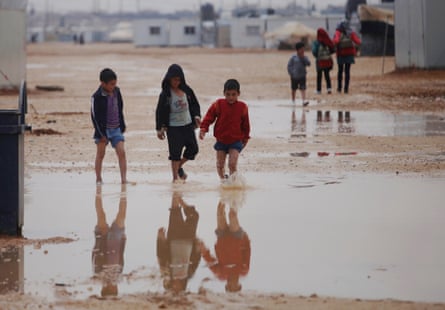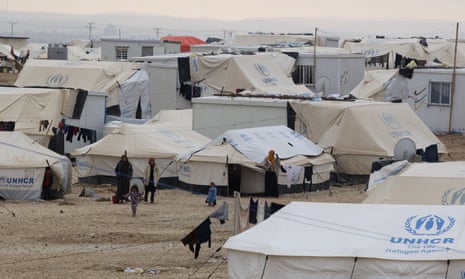The Zaatari refugee camp in Jordan was set up in 2011 and is now home to almost 90,000 people who have fled the war in Syria. One resident describes his life in the camp, and how his family ended up there
Before the war started in Syria I was a carpenter in a village in the south of the country, close to Dara’a. I had a simple life, but a good life. But when the war began, people stopped wanting to build and spend money on such things, so life started to become harder.
I have nine children, aged between two and 16. One of my sons was two and a half when the war started. Every time he could hear bombing he would get very scared and hide under the covers. He still does this here in the camp when he sees planes coming over, as he thinks they are coming to bomb us.
My children haven’t only seen bombing; they have also seen death with their own eyes. One of my cousins has lost two children, and his mother, sister and brother, from the bombing. This is why I left: I had to save my family’s lives.
When we arrived at the Zataari camp in February 2013 it was very cold. At first we were all living in a tent that used to leak every time it rained. But there was no option. We either stayed in that tent or took our children to their death.
My wife was about to give birth to twins so it was important to get more settled before their arrival. I borrowed money from a friend to buy two caravans for us to live in. Imagine once living in your own house and now you come home to a caravan where there isn’t enough space to sit or sleep and no electricity.
I’ve heard that most of the houses in our village have now been destroyed so there are very few people left. We find out what is happening back home mostly through a neighbour who sends us messages. Even though I’m here in Jordan, whenever I hear news about my homeland I feel as if I am with my fellow Syrians. What is happening there has affected me deeply.

I don’t care about my future, I only care about the future of my children. I don’t care about anything other than their education. I had no education so it is too late for me, but it is not too late for them. I want to encourage them to study. I want my children to have a better life than the one I had.
We tried to emigrate but I didn’t want to go to Turkey and then onwards from there. I don’t think we would survive the journey.
If I could move directly to another country, I would not stop for a second, if we ever get such a chance then we will definitely take it. I actually tried this once, submitting an application to the French embassy, but they rejected us.
How can we have a normal life here? You can only leave the camp if you have permission. There are good and bad people here, so it is difficult to protect your children in this environment. And if anyone gets sick we have to go and stand in a clinic for hours.
But this is our life now. If I could find a country that would take myself and my children I would go there without hesitation. I wish that all the countries of the world would open their doors to Syrian refugees. More than this, I cannot wish for anything.
